BERKELEY / City settles suit against university over growth / Payments for fire protection, sewer to rise -- joint planning on development OKd
Patrick Hoge, Tanya Schevitz, SF Gate Chronicle Staff Writers
May 26, 2005
The city of Berkeley settled a lawsuit over UC Berkeley's growth plans after campus officials agreed Wednesday to more than double payments for city services and to jointly develop a downtown development plan.
Critics called the settlement a bad deal for the city and said it had been approved without adequate public review, while the Berkeley's mayor and Cal's chancellor called it a landmark deal.
"Without a question, this settlement is the single best agreement between any city and any university in California," said Mayor Tom Bates at a news conference with UC Berkeley Chancellor Robert Birgeneau.
"We think it represents a model for the entire state of California," agreed Birgeneau.
Berkeley sued the university Feb. 23 in an attempt to force the campus to further study on the impact of its long-range development plan, approved by the UC Board of Regents in January, that called for adding 2.2 million square feet of building space by 2020.
The City Council approved the settlement in closed session Tuesday, and UC regents approved it in closed session Wednesday in San Francisco. As part of the deal, the city dropped demands for millions of dollars in sewer and parking fees.
Under the agreement, the university will increase the amount it pays for city services such as sewers and fire protection from a flat $500,000 to an initial $1.2 million a year plus annual increases of 3 percent. The university also promised to try to implement a use tax on campus purchases of out of state goods that could send another $200,000 to $500,000 a year to the city.
City Manager Phil Kamlarz estimated that the campus cost the city $9 million to $11 million a year in services, and that amount would grow by $2 million as a result of the school's growth plan through the year 2020.
The agreement also commits the university over the next four years to doing a joint study for revitalizing the downtown, an area bounded by Hearst Avenue, Dwight Way, Martin Luther King Jr. Way and Oxford Street.
The university will pay half the cost for the planning document and up to $250,000 for environmental review of it. While the plan will not be legally binding on the university, Bates said he expected it to be a powerful guide for university development.
In addition, the university agreed to add 1,270 parking spaces through the year 2015 instead of the 2,300 it had planned, barring additional review and conditioned upon improvements to local bus service.
For its part, the city agreed to drop its recent demands that the university pay higher sewer fees and taxes on most of the campus' 7,000 parking spaces, which university officials rejected because the UC system is exempt from local taxation.
City Councilwoman Dona Spring, one of three members of the nine-member council who voted against the settlement, said it did not get enough money from the university or exert enough control over development.
"It's a total giveaway," she said.
Carl Friberg of a group called Berkeleyans for a Livable University Environment (BLUE) also lamented the lack of city authority over university expansion.
"The mayor has signed the death warrant for the city of Berkeley," said Friberg, who notified Alameda County Superior Court that he would file a petition today seeking intervenor status in the city's lawsuit against the university.
Friberg's group said the city had been in a strong position to win its lawsuit against the university for allegedly failing to comply with the California Environmental Quality Act, which applies to the impact of developments on surrounding communities.
City officials countered that even if they won in court, the university would be required to provide more disclosure -- not pay more money or submit any development to city oversight. The city would not have been entitled to attorneys fees that are expected to total about $250,000.
Bates said he and other council members had wanted to make details of the deal public before Wednesday, but the city attorney told them they could not because of a confidentiality agreement that negotiators on both sides had signed.
"Unbeknownst to the mayor and the City Council members, an attorney signed a confidentiality agreement prohibiting the public from having even one minute to comment on this 15-year agreement," said City Councilman Kriss Worthington. "I think it's grossly unfair to the public." |
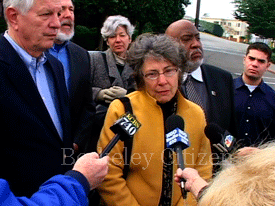
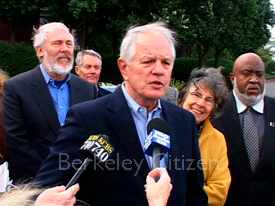
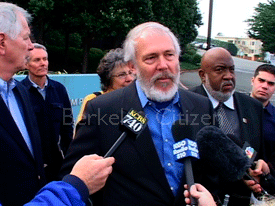
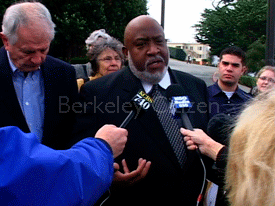
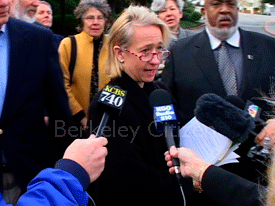
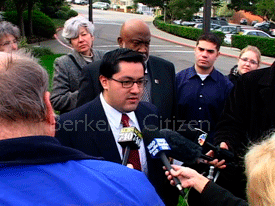
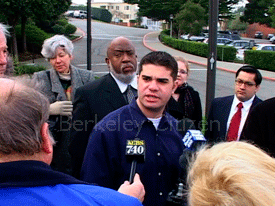
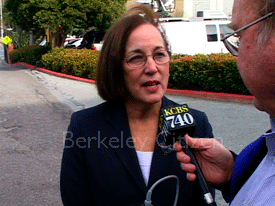
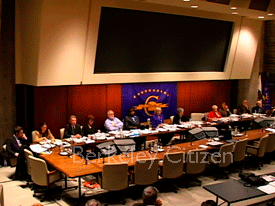
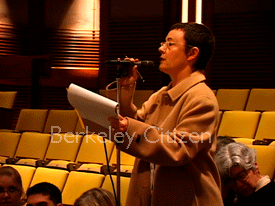
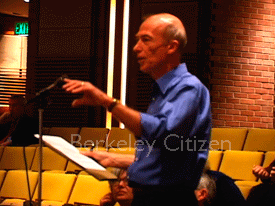
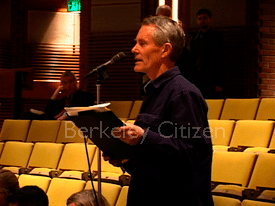
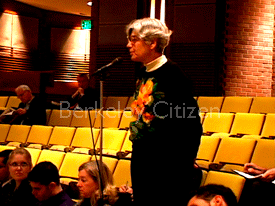
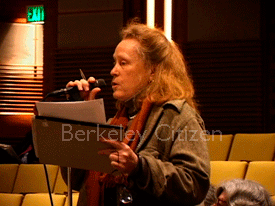
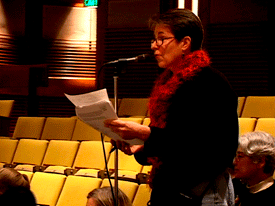

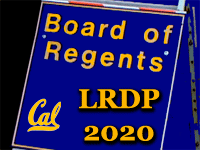 Berkeley Press conference and comments include the following: Tom Bates, Gordon Wozniak, Linda Maio, Darryl Moore, Anne Wagley, Jesse Arreguin, Andy Katz, Pamela Sihvola, Janice Thomas, Carl Friberg, Jim Sharp, Daniella Thompson, Leslie Emmington AND Irene Hegarty, UC-Berkeley’s director of community relations.
Berkeley Press conference and comments include the following: Tom Bates, Gordon Wozniak, Linda Maio, Darryl Moore, Anne Wagley, Jesse Arreguin, Andy Katz, Pamela Sihvola, Janice Thomas, Carl Friberg, Jim Sharp, Daniella Thompson, Leslie Emmington AND Irene Hegarty, UC-Berkeley’s director of community relations.